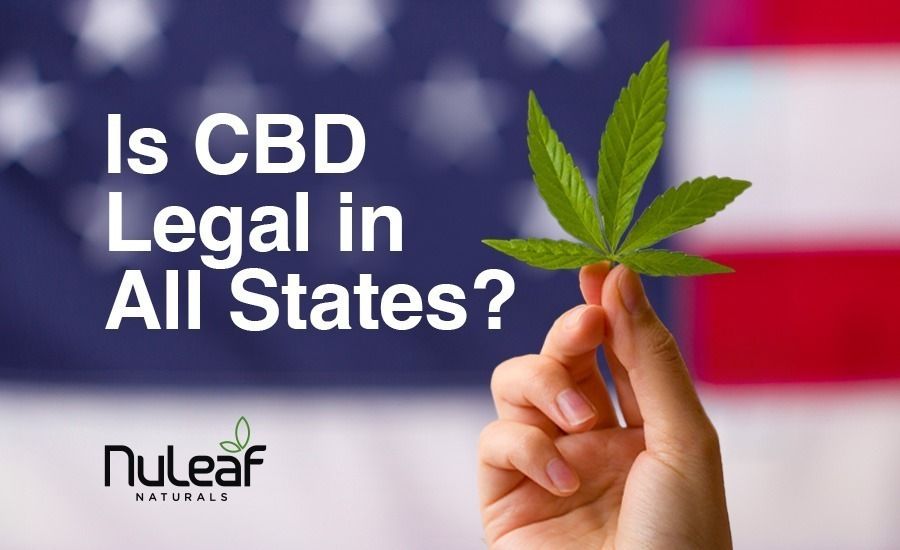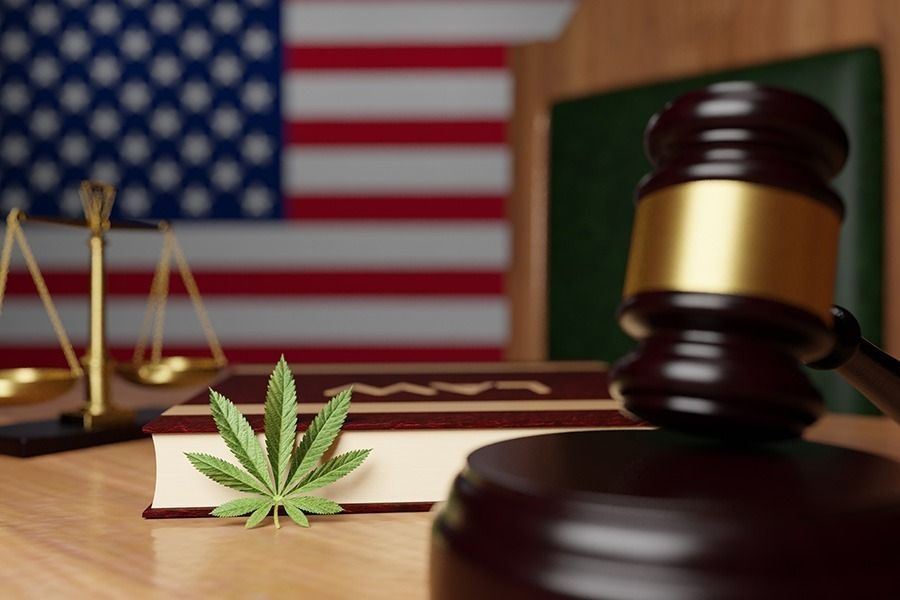Is CBD Legal in All States?

CBD, and cannabis legality in general, has rapidly evolved across the U.S. in the last few years. As restrictions on hemp and cannabis continue to ease in light of new legislation, one can only expect the popularity of CBD and THC products to increase even more.
However, CBD legality in the United States is still in a state of limbo. While some states allow for recreational use of CBD products, others restrict access to medical use only, and a few states continue to outlaw CBD altogether.
In this article, we’ll explore the transformative 2018 Farm Bill and how it paved the way for hemp production. We’ll also examine the states where CBD is currently legal and look ahead to the implications of the 2023 Farm Bill on the ever-changing legal landscape.
The 2018 Farm Bill
The 2018 Farm Bill was a game-changer for the hemp industry in the United States. Before its enactment, no legal distinction existed between hemp and other cannabis plants.
Here’s what the bill introduced:
- Legalization of Hemp Production: The bill legalized the production and sale of hemp, but with a crucial stipulation: the THC (tetrahydrocannabinol) content must be less than 0.3% by dry weight. THC is the compound responsible for the “high” produced by cannabis consumption.
- Historical Context: This move was revolutionary. Historically, despite its non-psychoactive nature, hemp was lumped with higher-THC strains of cannabis, making its cultivation and sale illegal.
- Regulation of Hemp Production: The legalization didn’t result in a free-for-all. Strict regulations were put in place to ensure the integrity of hemp production. For instance, hemp cultivators must apply for a license, which requires the U.S. Department of Agriculture’s (USDA) approval.
- Marketing Restrictions: The bill also imposed restrictions on marketing. No hemp product, including CBD, can be marketed with medical or health-related benefits claims without scientific evidence.
This legislation paved the way for the burgeoning CBD industry, setting the stage for further discussions and regulations, such as the anticipated 2023 Farm Bill.
What Factors Affect CBD Legality?
Medical vs. Recreational CBD
The sudden presence of CBD products in various forms, from gummies to lotions, has raised questions about its legality. The legality of CBD often depends on its intended use. Medical CBD may be subject to different regulations compared to recreational CBD, and the availability of both can vary by state.
THC Content
The concentration of THC (the psychoactive compound in cannabis) in CBD products is a significant factor in legality. Federal law allows CBD with less than 0.3% THC, but some states have stricter regulations.
State vs. Federal Laws
Despite the federal stance on CBD, individual state laws can differ. Some states may allow the sale and consumption of CBD, while others may impose restrictions or bans. It’s essential to be aware of state and federal laws when buying or selling CBD products.

State-by-State CBD Legality Breakdown
In the United States, cannabis is illegal at the federal level, but 46 states and territories have legalized it in some way. Some have only approved medical cannabis programs, while others have allowed medical and recreational use. Here is a breakdown of which states have fully legalized CBD and which have legalized it under certain conditions.
Fully Legal
Cannabis has been legalized for recreational use in the following states. By extension, CBD products, whether for medical or recreational use, are also fully legal in these states. This means residents can access CBD without any restrictions.
- Alaska, Arizona, California, Colorado, Connecticut, Illinois, Maine, Massachusetts, Michigan, Montana, Nevada, New Jersey, New York, Oregon, Vermont, Virginia, Washington, and Washington DC.
Conditionally Legal
In these states, CBD is legal under certain conditions, such as being hemp-derived and under 0.3% THC. A few states, including Idaho and Kansas, don’t allow any traceable THC in CBD products. Residents might need a prescription or medical card to access CBD products, and the list of acceptable qualifying conditions to obtain a medical card varies depending on the state.
- Alabama, Arkansas, Delaware, Florida, Georgia, Hawaii, Idaho, Indiana, Iowa, Kansas, Kentucky, Louisiana, Maryland, Minnesota, Mississippi, Missouri, Nebraska, New Hampshire, New Mexico, North Carolina, North Dakota, Ohio, Oklahoma, Pennsylvania, Rhode Island, South Carolina, South Dakota, Tennessee, Texas, Utah, West Virginia, Wisconsin, and Wyoming.
Source: https://worldpopulationreview.com/state-rankings/cbd-legal-states
The 2023 Farm Bill
Since the 2018 Farm Bill legalized hemp at the federal level, the hemp industry has seen significant growth across the U.S. However, the 2018 Farm Bill also led to the production and sales of minor cannabinoids with psychoactive effects, such as delta-8 THC and THC-O-acetate.
These products created a grey market, especially in states that haven’t legalized adult-use cannabis. Recently, the House Agriculture Subcommittee on Biotechnology, Horticulture, and Research held a panel to discuss improvements to the current rules on hemp production.
Here are the main takeaways that could affect CBD legality moving forward:
- FDA’s Position on CBD: The FDA’s unclear stance on CBD has impacted the industry significantly. Big retailers have hesitated to carry CBD products, and many companies are reluctant to develop and manufacture CBD-related products. This uncertainty has led to a decline in hemp production since 2019.
- Raising the THC Threshold: One of the main discussions revolves around increasing the allowable THC threshold in hemp from the current 0.3% to 1%. This change could improve the quality of hemp products and benefit the industry. Allowing hemp breeders to work with varieties having higher THC levels could lead to the development of superior hemp varieties tailored for specific regions.
The 2023 Farm Bill aims to address these issues, unburden the industry, and resolve critical challenges to enhance the sector.
More information can be found here and here.
Final Thoughts
The 2018 Farm Bill marked a significant milestone in legalizing hemp-derived CBD in the U.S. The legal framework is constantly evolving, and the 2023 Farm Bill is expected to bring even more changes.
It is important to acknowledge that the general perception of cannabis and hemp is changing. As the use of CBD and other cannabis derivatives becomes more widely accepted, CBD laws and regulations are becoming less strict and more permissive.
This evolving perspective promises a brighter future for the hemp industry. Still, consumers and businesses alike must stay informed and adapt to the ever-changing legal landscape.
Remember, as the industry continues to grow and evolve, staying updated on the latest regulations and legal developments is critical to navigating the world of CBD with confidence.